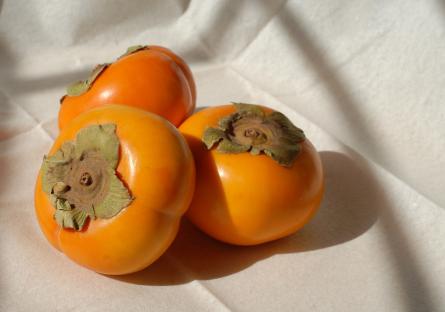This article appears for archival purposes. Any events, programs and/or initiatives mentioned may no longer be applicable.

A few weeks into fall, with Halloween around the corner, we’ve got a few things on the moments: Cooler weather. The holiday season. Time off from school and work. And let’s not forget: it’s almost persimmon season! We’re hitting that blessed time of the year when these squat and sweet fruits are in season, offering up a unique bouquet of sweet and spicy flavors to tantalize taste buds. Persimmons aren’t just delicious: they pack a healthy punch that can give health issues like heart disease and inflammation a knockout blow.
What Are Persimmons?
Originally hailing from China, this fragrant and sweet-tasting fruit is a bit tricky to classify. While it's technically a berry, the orange-colored persimmons' size and shape makes it look like a close cousin of the tomato. Hard and dense fruits, persimmons are a seasonal treat. They usually become available in mid-October and stick around until January.
There are hundreds of varieties of persimmons but the two most commonly available are Fuyus and Hachiyas. Fuyus are squatter and look more like tomatoes; they can be eaten while they're hard like apples and have a sweet yet slightly spicy taste profile. Hachiyas tend to be taller and have more of an acorn shape. The Hachiyas are best eaten when they're extremely ripe, as they take on a soft, jelly-like texture that makes them great for baked goods and other confectionery.
When shopping for persimmons, keep this in mind: if a Fuyu feels firm, it’s ready to take home. If a Hachiya is soft to the touch, it’s just right. The reverse doesn’t hold true: a soft Fuyu tastes awful, and a hard Hachiya will be loaded with so many tannins that it’s practically inedible.
Health Benefits of Persimmons
Persimmons aren't just a rare, seasonal treat: they're also a superfood. Persimmons are densely packed with antioxidants, fiber, and other essential nutrients. Persimmons are rich with:
- Vitamin A
- Vitamin C
- Vitamin E
- Vitamin K
- Vitamin B6
- Potassium
- Copper
- Manganese
- Riboflavin
- Folate
- Magnesium
- Phosphorus
- Thiamin
- Protein
- Fiber
Persimmons also make for a great guilt-free snack as they are low in calories. The kinds of antioxidants that persimmons contain have been linked to lower rates of heart disease, reduced risk of lung cancer, and help prevent age-related mental decline. The fruit's high beta-carotene content has also been found to be an effective preventative agent against colorectal cancer, metabolic disease, heart disease, and type 2 diabetes.
In addition to being heart-healthy, the vitamins in persimmons can also improve your eye health and possess anti-inflammatory properties.
Too Much of a Good Thing?
While persimmons can be a delectable treat, it’s best to eat them in moderation. Their high tannin content could lead to a few health problems if consumed in excess. These issues include stomach bleeding, constipation, and diarrhea. The tannins and pectin in persimmons can also build up to form stones called bezoars in the body that can cause uncomfortable blockages in the stomach and bowels.
Article by Austin Brietta
Want more wellness tips? Check out these stories: